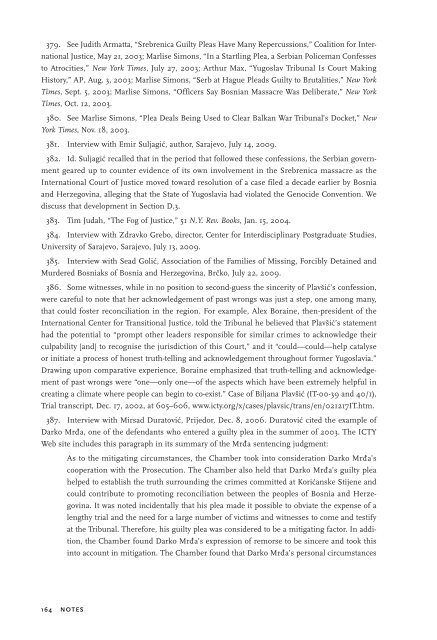That Someone Guilty Be Punished - International Center for ...
That Someone Guilty Be Punished - International Center for ...
That Someone Guilty Be Punished - International Center for ...
Create successful ePaper yourself
Turn your PDF publications into a flip-book with our unique Google optimized e-Paper software.
379. See Judith Armatta, “Srebrenica <strong>Guilty</strong> Pleas Have Many Repercussions,” Coalition <strong>for</strong> <strong>International</strong><br />
Justice, May 21, 2003; Marlise Simons, “In a Startling Plea, a Serbian Policeman Confesses<br />
to Atrocities,” New York Times, July 27, 2003; Arthur Max, “Yugoslav Tribunal Is Court Making<br />
History,” AP, Aug. 3, 2003; Marlise Simons, “Serb at Hague Pleads <strong>Guilty</strong> to Brutalities,” New York<br />
Times, Sept. 5, 2003; Marlise Simons, “Officers Say Bosnian Massacre Was Deliberate,” New York<br />
Times, Oct. 12, 2003.<br />
380. See Marlise Simons, “Plea Deals <strong>Be</strong>ing Used to Clear Balkan War Tribunal’s Docket,” New<br />
York Times, Nov. 18, 2003.<br />
381. Interview with Emir Suljagić, author, Sarajevo, July 14, 2009.<br />
382. Id. Suljagić recalled that in the period that followed these confessions, the Serbian government<br />
geared up to counter evidence of its own involvement in the Srebrenica massacre as the<br />
<strong>International</strong> Court of Justice moved toward resolution of a case filed a decade earlier by Bosnia<br />
and Herzegovina, alleging that the State of Yugoslavia had violated the Genocide Convention. We<br />
discuss that development in Section D.3.<br />
383. Tim Judah, “The Fog of Justice,” 51 N.Y. Rev. Books, Jan. 15, 2004.<br />
384. Interview with Zdravko Grebo, director, <strong>Center</strong> <strong>for</strong> Interdisciplinary Postgraduate Studies,<br />
University of Sarajevo, Sarajevo, July 13, 2009.<br />
385. Interview with Sead Golić, Association of the Families of Missing, Forcibly Detained and<br />
Murdered Bosniaks of Bosnia and Herzegovina, Brčko, July 22, 2009.<br />
386. Some witnesses, while in no position to second-guess the sincerity of Plavšić’s confession,<br />
were careful to note that her acknowledgement of past wrongs was just a step, one among many,<br />
that could foster reconciliation in the region. For example, Alex Boraine, then-president of the<br />
<strong>International</strong> <strong>Center</strong> <strong>for</strong> Transitional Justice, told the Tribunal he believed that Plavšić’s statement<br />
had the potential to “prompt other leaders responsible <strong>for</strong> similar crimes to acknowledge their<br />
culpability [and] to recognise the jurisdiction of this Court,” and it “could—could—help catalyse<br />
or initiate a process of honest truth-telling and acknowledgement throughout <strong>for</strong>mer Yugoslavia.”<br />
Drawing upon comparative experience, Boraine emphasized that truth-telling and acknowledgement<br />
of past wrongs were “one—only one—of the aspects which have been extremely helpful in<br />
creating a climate where people can begin to co-exist.” Case of Biljana Plavšić (IT-00-39 and 40/1),<br />
Trial transcript, Dec. 17, 2002, at 605–606, www.icty.org/x/cases/plavsic/trans/en/021217IT.htm.<br />
387. Interview with Mirsad Duratović, Prijedor, Dec. 8, 2006. Duratović cited the example of<br />
Darko Mrd¯a, one of the defendants who entered a guilty plea in the summer of 2003. The ICTY<br />
Web site includes this paragraph in its summary of the Mrd¯a sentencing judgment:<br />
As to the mitigating circumstances, the Chamber took into consideration Darko Mrd¯a’s<br />
cooperation with the Prosecution. The Chamber also held that Darko Mrd¯a’s guilty plea<br />
helped to establish the truth surrounding the crimes committed at Korićanske Stijene and<br />
could contribute to promoting reconciliation between the peoples of Bosnia and Herzegovina.<br />
It was noted incidentally that his plea made it possible to obviate the expense of a<br />
lengthy trial and the need <strong>for</strong> a large number of victims and witnesses to come and testify<br />
at the Tribunal. There<strong>for</strong>e, his guilty plea was considered to be a mitigating factor. In addition,<br />
the Chamber found Darko Mrd¯a’s expression of remorse to be sincere and took this<br />
into account in mitigation. The Chamber found that Darko Mrd¯a’s personal circumstances<br />
164 NOTES

















